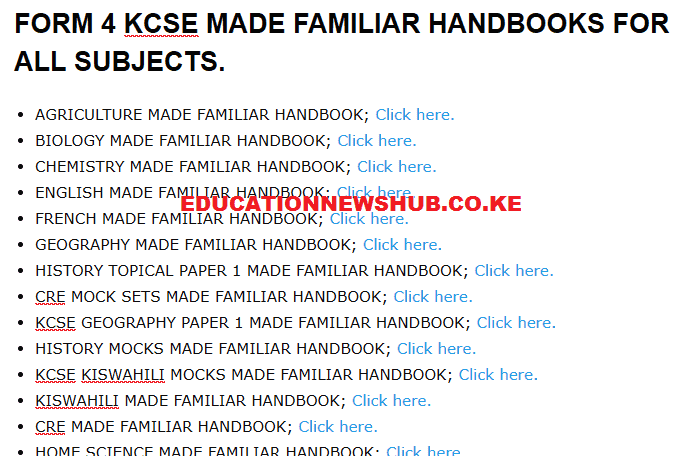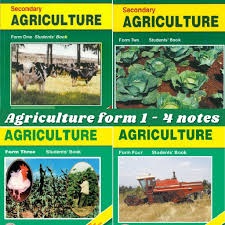ULTIMATE ACHIEVERS ACADEMY
Name___________________________________________________AdmNo:__________
Date__________________________________________Sign______________
END OF TERM EXAMINATION
FORM THREE
CHRISTIAN RELIGIOUS EDUCATION
TIME 2 ½ HRS
Instructions to candidates:
- This paper consists 6 questions
- Answer any 5 questions in the answer booklet provided.
| Questions | 1 | 2 | 3 | 4 | 5 | 6 |
| Marks |
Download free unlimited CRE resources below; Educationnewshub.co.ke:
CRE FORM 1 EXAMS WITH MARKING SCHEMES
CRE free lesson plans for all topics (Form one to four)
CRE NOTES FOR FORM ONE TO FOUR BOOKLET
KNEC CHRISTIAN RELIGIOUS EDUCATION, CRE, SYLLABUS
CRE Form 1-4 Notes and Exams (Free downloads)
CRE Topic By Topic Questions And Answers
CRE SCHEMES OF WORK FOR FORM ONE
CRE Notes and Exams for Form one to Four; Free Downloads

QUESTIONS
- a) State 7 teachings from the Genesis stories of creation. (7mks)
- b) Outline 4 differences between the traditional African view of evil and biblical concept of sin. (8mks)
- c) Explain how human beings fail to carry out the responsibilities given to them by God. (5mks)
- a) List down the teachings of Amos on social justice and responsibility. (7mks)
- b) State 7 ways God would punish Israel
- c) How can Christians assist the church leaders to perform their duties effectively. (6mks)
- a) Outline the teachings of Jeremiah on judgment and punishment (7mks)
- b) Identify 6 symbolic acts of Jeremiah on Judgment and punishment (6mks)
- c) What evidences from the book of Jeremiah show that he was a true prophet of God. (7mks)
- a) Describe the birth of Jesus. Luke 2: – 7 (6mks)
- b) State the activities that took place when Jesus was born (8mks)
- c) Outline the significance of the actions that took place during the birth of Jesus (6mks)
- a) Outline Jesus teachings on watchfulness and readiness. Luke 12: 35 – 38 (7mks)
- b) List down he Jewish practices that Jesus condemned. Luke 11: 37 – 54; 121: 1 – 3 (7mks)
- c) Mention ways in which Christians today observe the Sabbath (6mks)
- a) Explain how unity of believers is expressed in the symbol of the bride. (7mks)
- b) Identify 7 factors that caused disunity in the early church at Corinthians (7mks)
- c) Give 6 factors that have contributed to national unity in Kenya (6mks)
CHRISTIAN RELIGIOUS EDUCATION
FORM THREE MARKING SCHEME
- a) Teaching from the Genesis stories of creation
- .God is the creator of everything on earth
- Human being are co-creators with God
- Man and women are equal before God
- Human beings are superior to the rest of creation.
- Marriage is blessed by God.
- Work and leisure are instituted by God.
- Human being should devote one day a week to worship God.
- The environment is God gifted for human beings to export and their own benefits.
- Human life is God given and sacred.
7 x 1 = 7mks
b). Difference between traditional Africa views of evil and biblical concept of sin.
- The biblical account emphasizes on personal nature of sin while Africa emphasizes more on the social nature and consequences of evil.
- In the bible sin is punished in the next life while Africa believe that punishment of sin is here on earth.
- In the bible sin does not leave human beings doomed forever but they are offered escape route and a message of hope through Christ death and resurrection whereas African society offer a final solution to evil.
- In the bible people are born sinners while in African society a child is born free from evil
- Bible teaches that sin in caused by mans thoughts and deeds while African society believe that evil is caused by evil spirits.
- In the bible there is eternal punishment for sinners while traditional African communities believe that punishment is here on earth.
4 x 2 = (8mks)
- c) Ways in which human beings fail to carry out responsibilities given to them by God.
- Carrying out abortion
- By using contraceptives
- Practicing celibacy/failing to marry
- Through deforestation
- Failing to prevent soil erosion
- Failing to worship him/filling to observe the Sabbath
- Mining and excavation leading to open ground
- Polluting the environment
- Murder
- Sexual immorality
- a) Teachings of prophet Amos on social justice and responsibility
- The poor were sold for silver and a a pair of sandals as payment of debt.
- The rich women of Samaria lived in excessive luxury at the expense of the poor.
- The rich exploited the farmers by taking an excessive share of their harvest,
- The rulers lived in magnificent houses.
- The merchants exploited the poor by selling to them poor quality goods and using false scales.
- The rulers were arrogant, trusted in material possessions and indulged in wine.
- The judges were corrupt and took bribes from the rich.
- Excessive drinking was wide spread and the Nazirites were forced to drink.
- Those who spoke the truth were hated.
- The accused told lies in law courts
- There was sexual immorality and temple prostitution.
- There was misuse of garments taken as pledges.
- There was robbery with violence.
7 x 1 = 7mks)
- b) Ways through which God would punish Israel
- Invasion by a foreign nation
- Destruction of places of worship
- Attack by epidemics
- God would send an eclipse
- They would be taken to exile
- God would send an earth quake to destroy their houses.
- The rich who oppressed the poor would not enjoy their wealth.
7 x 1 = 7mks
- c) How Christians can assist church leader perform their duties
- giving financial/material help
- Advising counseling them on various issues
- Encouraging them in their work
- Participating fully in church activities/functions
- Giving tithes/offerings faithfully
- Praying for them
- Respecting them
- Practicing/obeying the word of God
- Defending them against unfair criticism
- Providing training opportunities for them.
6 x 1 = 6mks)
- a) Teachings of Jeremiah on judgment and punishment
- God was going to punish the people for their sins against God.
- God judges people by looking into their hearts.
- Divine judgment would be fall the people of Judah as a group
- God would execute judgment by means of political and historical events.
- Gods punishment was unavoidable.
- The purpose of Gods punishment is to correct the sinner.
- God gave the people a chance to repent before he punished them
- Gods judgment is universal
- Gods judgment is real.
7 x 1 = 7mks)
- b) Symbolic acts of Jeremiah on judgment and punishment
- the wearing of the linen waist cloth
- the wearing of the wooden ox yoke.
- Jeremiahs personal life.
- Remolding of the clay by the potter.
- The parable of the wine jars/wineskins
- The vision of the two baskets of figs
6 x 1 = 6mks)
- c) Evidences from the book of Jeremiah that shows that he was a true prophet.
- What he prophesied came to pass.
- He received his call from God
- He was prayerful
- His messages came from God.
- He mediated between God and the people.
- He condemned social evils in Israel.
- He lived according to the covenant way of life
- He faced stiff opposition and rejection from the people
- He obeyed Gods command e.g Not to marry.
- a) The birth of Jesus Luke 2 : 1 – 27
- in those days Caesar Augustus issued a decree that a census should be taken of the entire Roman world.
- Everyone went to their own town to register.
- Joseph also went from Nazareth to Bethlehem because he belonged to the house of David.
- He went to register with Mary who was expecting a child.
- While they were there she gave birth to her first born, a son.
- She wrapped him in cloths and laid him in a manger.
6 x 1 + 6mks)
- b) Activities that took place when Jesus was born. Luke 2 : 8 – 20
- There were shepherds looking after their flocks nearby at night
- An angel of the Lord appeared to them.
- The glory of the lord shone around them and they were terrified.
- The angle told them not to be afraid for he had brought good news to them.
- The told them that a savior had been born.
- He gave them a sign: They will find a baby wrapped in cloths and lying in a manger.
- Suddenly a great company of heavenly hosts appeared with the angels singing
- When the angels disappeared, the shepherds left for Bethlehem.
- They found Joseph, Mary and the baby as they were told.
- They told them what the angel had told and they were amazed.
- Mary treasured up all these things and pondered them in her heart.
- The shepherds returned glorifying God.
8 x 1 = 8mks)
- c) significance of the actions that took place during the birth of Jesus.
- Jesus birth in Jerusalem fulfilled Micah’s prophecy
- The census helped to know payment of taxes and those to join the army
- Jesus being born in a stable and lain in a manger shows that he was humble
- The angles reporting the news to the shepherds shows that Jesus is a good shepherd.
- The angels singing in heavens showed that Jesus is indeed the son of God.
- The shepherds visiting Mary and Joseph confirmed the message of the angel.
6 x 1 = 6mks)
- a) Jesus teachings on watchfulness and readiness Luke 12: 35 – 48
- believers should be dressed for his coming
- They should keep their lamps burning
- They should be awake/alert.
- Those who are found waiting will be blessed
- They should be prepared at all time since they don’t know the time for his coming.
- Believers should continue working until Christ comes back.
- The servants who mistreat fellow workers will be punished
- Those who do not do what is required of them will receive a severe beating.
- Believers are expected to respond to God according to how much they have received from him.
- Those who do wrong out of ignorance will receive a lesser beating/punishment
7 x 1 = 7mks)
- b) Jewish practices that Jesus condemned. Luke 11: 37 – 54, 12 : 1 – 3
- Cleaning the outside while the inside was not holy/dirt
- They gave tithes according to the law but failed to practice love, mercy and justice
- They loved the high seats in the synagogue to be noticed as righteous people
- Scribes and teachers of the law failed to make people understand the interpretations of the law of God
- They attended to their animals on Sabbath day but failed to do so to human life.
- They loved money a lot.
- They prayed with pride in their hearts.
- They were a stumbling block to those who would be sincere
- They loved to be greeted with respect in the market places
7 x 1 = 7mks)
- c) Ways in which Christians observe the Sabbath
- Christians attend church services
- They read the scriptures
- They listen to the word of God from the preachers
- They give offerings and pay tithes
- They visit the sick and preach to them
- They retrain from work and spend time with their families.’
- They help the less fortunate in the society
6 x 1 = 6mks)
- a) How unity of believers is expressed in the symbol of the bride.
- The bride represents Christians
- The bride groom represents Jesus.
- Christians as the bride should be pure.
- Gods relationship with his people is perfect and lasts eternally.
- Christians should be committed to Christ as the bride is committed to the groom
- The church is loved by Christ as the bride is loved by the bride groom.
- Christians will be taken to a new home where they will live with Christ forever.
7 x 1 = 7mks)
- b) Factors that caused disunity in the early church
- Eating of the meat offered to the idols
- Dispute over church leadership
- Misuse of spiritual gifts
- The abuse of the Lord’s supper
- Misunderstanding of the covering of the head during worship
- Rampant cases of sexual immorality
- Disputes over marriage and divorce
- Setting disputes in civil courts.
- Misunderstanding of the resurrection of the body/dead
- c) Factors that have contributed to national unity in Kenya
- The constitution
- The national assembly
- The national anthem
- The presidency
- Religion
- National language
- Education
- Common currency
- Sports. 6 x 1 = 6mks)




